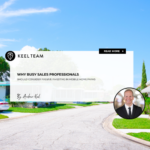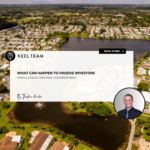The Pros & Cons of 3rd-Party Management in Mobile Home Park Investing
-
 Tristan Hunter - Investor Relations
Tristan Hunter - Investor Relations

Mobile home park investing can offer strong returns, but managing a mobile home park takes time, effort, and expertise. Some owners handle operations themselves, while others hire a third-party management company. Both options come with advantages and challenges. Understanding the pros and cons of third-party management can help investors decide if outsourcing management is the right choice for their mobile home park.
What Is Third-Party Management in Mobile Home Park Investing?
Third-party management involves hiring an external company to handle the daily operations of a mobile home park. These companies take care of rent collection, maintenance, tenant relations, and financial reporting. They often bring industry experience and established systems to improve efficiency.
The Pros of Third-Party Management in Mobile Home Park Investing
1. Saves Time and Reduces Workload
Managing a mobile home park requires constant attention. Rent collection, maintenance issues, and tenant concerns can take up significant time. A third-party management company handles these tasks, allowing owners to focus on other investments or responsibilities.
2. Provides Professional Expertise
Many third-party management companies specialize in mobile home parks. Their experience helps streamline operations, reduce costs, and improve tenant retention. They often have established relationships with maintenance providers, legal experts, and contractors, which can lead to better service and pricing.
3. Enhances Rent Collection and Financial Oversight
Third-party managers typically use professional systems for rent collection, financial reporting, and budgeting. They can track income and expenses carefully, providing owners with clear financial reports. This structured approach may potentially improve cash flow consistency.
4. Improves Tenant Relations
Handling tenant concerns requires strong communication and problem-solving skills. A third-party management company responds to issues, enforces lease agreements, and aims to ensure that tenants follow mobile home park rules. Their experience may help reduce conflicts and improve community satisfaction.
5. Helps with Legal and Compliance Issues
Mobile home park regulations vary by location. Third-party managers usually stay updated on local laws, fair housing requirements, and lease agreements. Their knowledge may help owners avoid legal disputes or compliance issues.
6. Streamlines Maintenance and Repairs
Routine maintenance and emergency repairs can be challenging for owners, especially those managing multiple mobile home parks. A management company typically coordinates repairs, schedules inspections, and ensures that infrastructure remains in good condition.
7. Allows for Remote Ownership
Some investors own mobile home parks in different states or regions. Third-party management can make remote ownership possible by providing on-the-ground support. Owners do not need to be physically present to handle daily operations.
Download our FREE eBook on the Top 20 things to know BEFORE investing in mobile home parks!
The Cons of Third-Party Management in Mobile Home Park Investing
1. Increases Operating Costs
Hiring a third-party management company comes with fees. These may include a percentage of rent collected, maintenance costs, or additional charges for specific services. Investors need to weigh these expenses against the benefits.
2. Reduces Direct Control
Outsourcing management means giving up direct control over operations. Owners may not have as much influence over tenant interactions, maintenance decisions, or community rules. Some investors prefer a hands-on approach and may find this challenging.
3. Varies in Quality and Reliability
Not all third-party management companies operate at the same level. Some provide excellent service, while others may not meet expectations. Poor management can lead to increased vacancies, maintenance delays, and tenant dissatisfaction. Owners should research and vet companies carefully.
4. Limits Customization of Management Style
Every mobile home park has unique needs, and some third-party managers use a standardized approach. This may not align with an owner’s preferred management style or long-term goals. Owners who want tailored solutions may need to work closely with the management company to ensure alignment.
5. May Have Less Focus on Cost Efficiency
A management company may not prioritize cost savings the way an owner would. Since they are paid based on fees or percentages, they might not negotiate vendor contracts as aggressively or seek out the most cost-effective solutions.
6. Can Lead to Communication Challenges
Owners rely on third-party managers for updates and problem resolution. If communication is slow or unclear, owners may feel disconnected from their investment. Clear reporting structures and regular check-ins can help mitigate this issue.
7. Potential for Conflicts of Interest
Some third-party management companies have relationships with vendors, contractors, or service providers. This may lead to decisions that benefit the management company rather than the owner. Owners should review contracts and ensure transparency in financial reporting.

How to Decide if Third-Party Management Is the Right Choice for You
Investors should consider their experience level, time availability, and investment goals before deciding on third-party management. Some questions to ask include:
- Do I have the time to manage a mobile home park effectively?
- Do I have experience handling tenant relations and maintenance?
- Am I comfortable with the costs associated with third-party management?
- Do I want direct control over day-to-day operations?
- Am I investing in mobile home parks remotely?
For investors who prefer passive income and professional oversight, third-party management may be beneficial. For those who want full control and cost management, self-management may be the better choice.
Final Thoughts
Third-party management can offer convenience, expertise, and efficiency in mobile home park investing. However, it typically comes with costs, potential communication challenges, and reduced control. Investors should weigh the pros and cons carefully to determine the best approach for their mobile home park. Choosing the right management strategy can impact cash flow, tenant satisfaction, and long-term investment success. Choose wisely!
Are you looking for MORE information? Book a 1-on-1 consultation with Andrew Keel to discuss:
- A mobile home park deal review
- Due diligence questions
- How to raise capital from investors
- Mistakes to avoid, and more!
Disclaimer:
The information provided is for informational purposes only and is not investment advice or a guarantee of any kind. We do not guarantee profitability. Make investment decisions based on your own research and consult registered financial and legal professionals. We are not registered financial or legal professionals and do not provide personalized investment recommendations.

Tristan Hunter - Investor Relations
View The Previous or Next Post
Subscribe Below 👇





